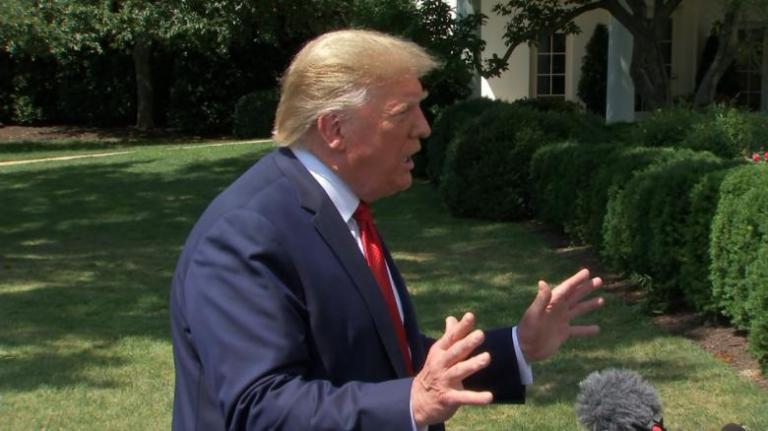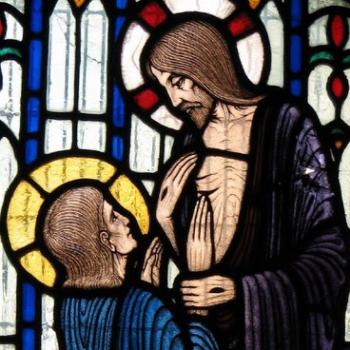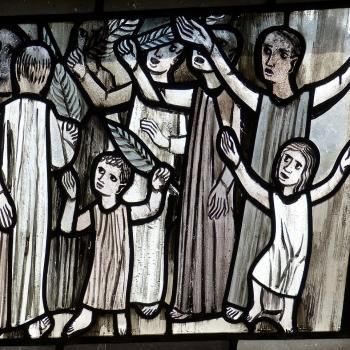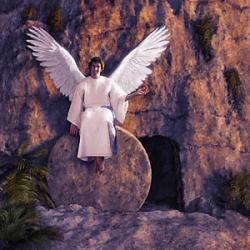So that just happened. In a wide-ranging “conversation” with reporters on the White House lawn yesterday, Donald Trump looked toward the sky and said “I am the chosen one.” Really. Context is important, of course. Trump was talking about trade wars with China, something that he claimed previous Presidents dropped the ball on. Since he believes he is not dropping the ball, he is apparently the “chosen one” to get this done.
But this is not the first time President Trump has made such claims. Before he was even elected President, he pronounced that “only I can solve” the many problems facing our country. Early yesterday morning he favorably retweeted comments from a conservative pundit claiming that citizens of Israel consider Trump to be some kind of “King” and “the second coming of God.” So perhaps he thinks he is “the chosen one” in more ways than just trade wars.

There are many contexts—fiction, movies, superheroes, and so on—in which the notion of “the chosen one” is central. But for millions of Christians in this country, the phrase is a dog whistle, code words that point toward a person who is divinely inspired and favored by God. Machiavelli wrote that there is nothing that will solidify a political leader’s power more reliably than convincing people that her or his power is divinely ordained and that by supporting the leader, one is aligning oneself with God’s will.
I am currently in the middle of watching Netflix’s disturbing documentary series “The Family,” in which a shadowy group of Christians works behind the scenes to raise persons believed to be “chosen” by God to positions of authority and keep them there. And there are millions of evangelical Christians in this country who believe that in Donald Trump, we have precisely the person “chosen” by God to lead this country back to God and to protect it against the attempts of atheists and liberals to turn it in the other direction. Whether Trump truly believes himself to be divinely “chosen” is one thing. What is clear is that he has learned how to communicate effectively and directly with those who believe that he is.
In a recent article in The Atlantic, Peter Wehner—himself an evangelical Christian—begins his article by describing the various ways in which white evangelical Christians, who voted for Trump in 2016 in massive numbers and continue to give him higher than 80% approval ratings two years later, consider Trump to be more than just the “not-Obama” that they had been hoping for.
Ralph Reed, the Faith and Freedom Coalition’s founder and chairman, says that “There has never been anyone who has defended us and who has fought for us, who [sic] we have loved more than Donald J. Trump. No one!” A Trump supporter told Wehner, after attending a Trump rally in Orlando, upon guarantee of anonymity (so as to avoid personal and professional repercussions) that “I have never witnessed the kind of excitement and enthusiasm for a political figure in my life. I honestly couldn’t believe the unwavering support they have. And to a person, it was all about ‘the fight.’”
The Trump supporter went on to say that many of the people he spoke to believe that Trump’s Presidency “is spiritually driven.” Wehner writes that
I asked whether he meant by this that Trump’s supporters believe God’s hand is on Trump, this moment and at the election—that Donald Trump is God’s man, in effect—he told me, “Yes—a number of people said they believe there is no other way to explain his victories. Starting with the election and continuing with the conclusion of the Mueller report. Many said God has chosen him and is protecting him.”
For these supporters, Trump’s announcement yesterday that he is “the chosen one” was a confirmation that he gets it, that he recognizes what they have believed all along, that the Lord often works in (very) mysterious ways, and that the Divine’s hand is upon this man. Which, of course, means that anyone who disagrees is not only blind to Trump’s perceived successes, but also is deliberately and willingly resisting God’s will.
I have spent a lot of time over the past three years on this blog trying to figure out this phenomenon, which seems not only false and dangerous, but false and dangerous on steroids. It is of importance and interest to me not only because I am a concerned citizen, but also because I am a product of the fundamentalist, evangelical Christian world. I have relatives who are Trump supporters, although I don’t imagine that they would go so far as to say that Trump is God’s man. They might, however, go so far as to suggest that Hillary Clinton was Satan’s candidate, so anyone who defeated her is, by process of elimination, on God’s side.
Many of the explanations I’ve come up with have to do with policy (stacking the courts with conservative, pro-life judges, for instance), policies so important in some people’s minds that all manner of moral failings can be overlooked in a person who is on the right side of such policies. But there’s something more going on here than policy preferences. Donald Trump perceived it during his candidacy when he said that he could murder someone in Times Square and not lose his base. He was right, and it is still true today. There is something close to cultish about the mindset of Trump’s most committed supporters, so much so that it would make sense for the opposition to save their breath when seeking to convince Trump’s base to change on the basis of a better health care plan. Members of a cult are not talked out of their commitments by reasoned arguments.
If evangelical Christians support Trump in such numbers and believe that he has been hand selected by God for his task, it’s not about policies. It’s about their perceptions of good and evil, light and darkness, the hosts of heaven and the hosts of hell. Wehner points out that Trump’s evangelical Christian supporters believe they are engaged in an existential battle, one that justifies siding with anyone they perceive to be a possible bulwark against the enemy—even a moral disaster like Donald Trump. Wehner writes that
[They believe] that they are engaged in an existential struggle against a wicked enemy—not Russia, not North Korea, not Iran, but rather American liberals and the left . . . Many white evangelical Christians are deeply fearful of what a Trump loss would mean for America, American culture, and American Christianity. If a Democrat is elected president, they believe, it might all come crashing down around us.
There is not enough room in one blog post, or even several, to discuss clearly all of the ways that this fear-based belief is not only fundamentally un-American and misguided, but also very dangerous. For those who profess the Christian faith, “perfect love casts out fear” is something worth remembering on a daily basis. I will not be afraid of those whom I approach with the love of Christ. Wehner writes eloquently in the second half of his article about various alternatives to fear that Christians should consider. But he ends his article with a sobering observation.
Evangelical Christians should acknowledge the profound damage that’s being done to their movement by its braided political relationship—its love affair, to bring us back to the words of Ralph Reed—with a president who is an ethical and moral wreck. Until that is undone—until followers of Jesus are once again willing to speak truth to power rather than act like court pastors—the crisis in American Christianity will only deepen, its public testimony only dim, its effort to be a healing agent in a broken world only weaken. At this point, I can’t help but wonder whether that really matters to many of Donald Trump’s besotted evangelical supporters.

















